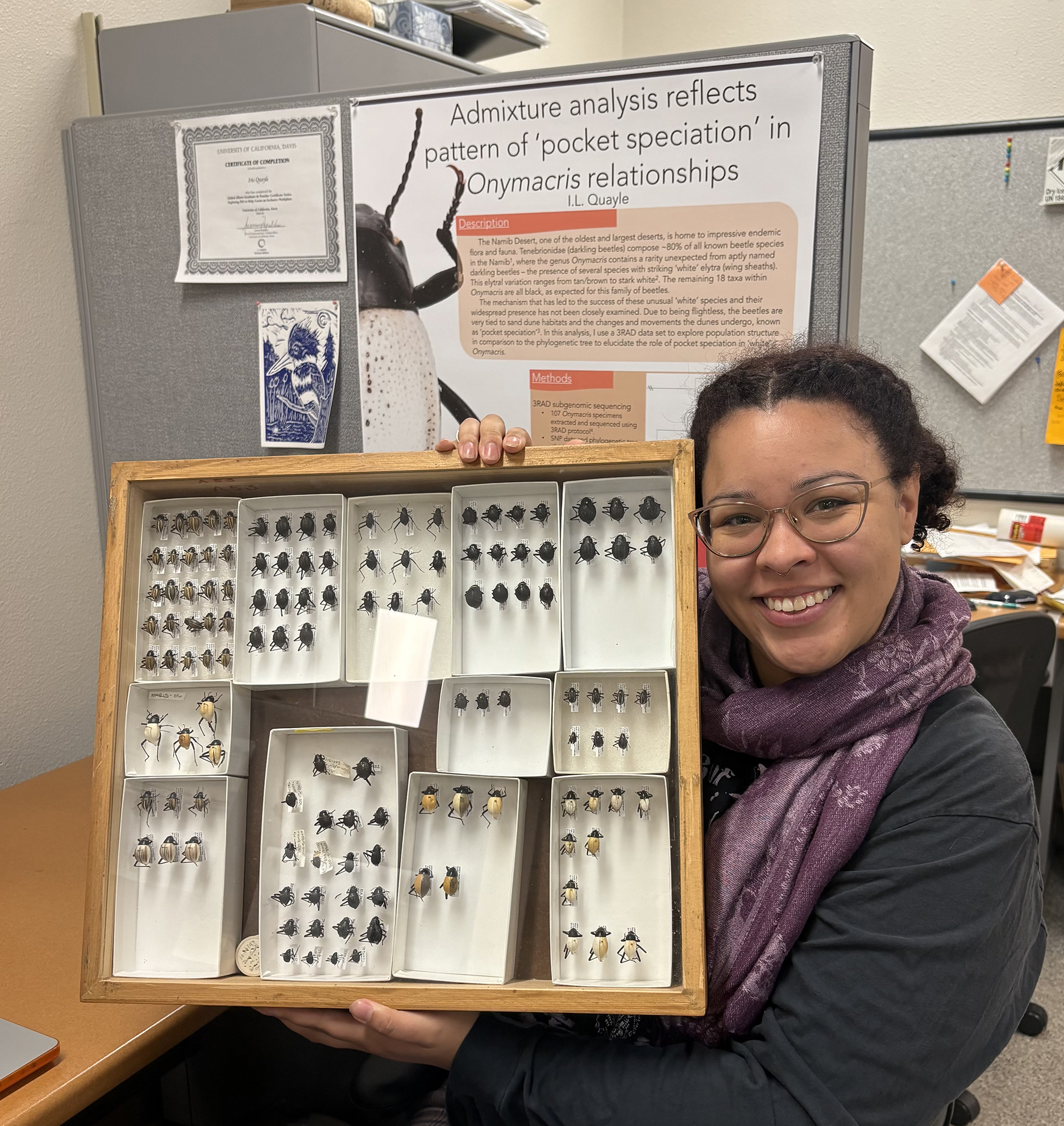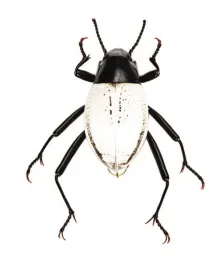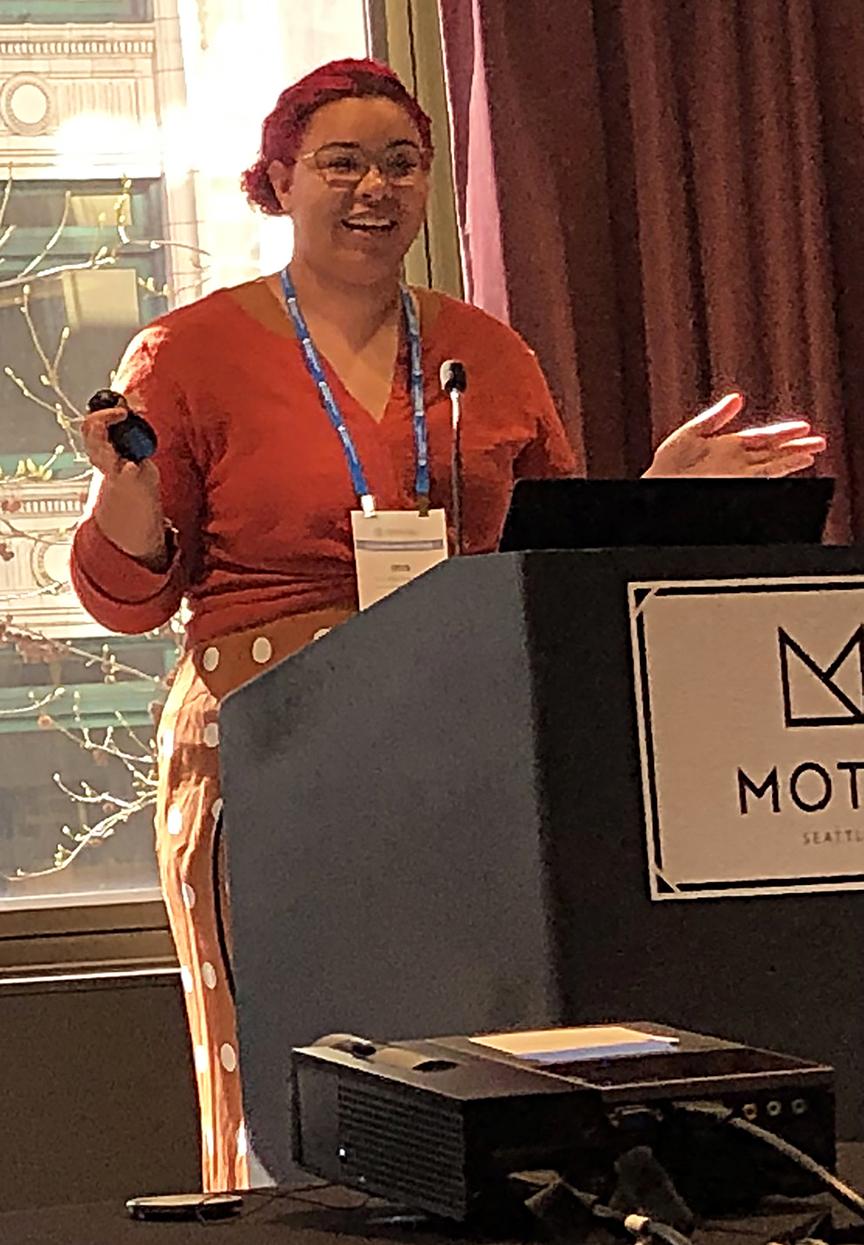
Iris Quayle: Off to Africa to Research Darkling Beetles
Doctoral student in the Jason Bond Lab

It's off to Africa for six months to research darkling beetles.
And Iris Quayle could not be more excited.
Quayle, a UC Davis doctoral student advised by Professor Jason Bond—he is the Evert and Marion Schlinger Endowed Chair in the Department of Entomology and Nematology, director of the Bohart Museum of Entomology, and associate dean of the UC Davis College of Agricultural and Environmental Sciences--recently received research authorization to study predation and collect specimens.
“I will be based at the Gobabeb Desert Research and Training Center for several months starting in October!” she said. “I'm super excited.”
“I will be studying ecological drivers of speciation as well as predation on Tenebrionid beetles in the Namib desert,” Quayle related. “The genus I study, Onymacris, has several species with 'white' elytra that are found primarily in the northern Sand Seas of the Namib desert, while the rest of the species in the genus are found in the southern Sand Sea and have black elytra which is typical of desert darkling beetles.”
She will be conducting field tests and collecting additional specimens related to her dissertation, "A Timely Examination of the Trait Evolution, Phylogenetics, and Ecology of the Charismatic Namib Darkling Beetle Genus Onymacris (Coleoptera:Tenebrionidae)." The research will include "the genetic underpinnings, of 'white' coloration in this desert and a generic revision for Onymacris.”
The Gobabeb is located on the edge of the major Namib Sand Sea which will allow “plenty of access to the desert and the beetles," she said.

Specifically, the UC Davis doctoral student will be engaging in several tests in the field. "The main experiments will be predation tests in the northern and southern sand seas using clay and 3D printed models of the beetles. I will be doing mark and recapture survivability analyses to get a baseline understanding of the beetle's success in their environment. Also, I will be doing background assays to see if the beetles are choosing backgrounds that will aid in their camouflage and hence predator avoidance, which is a behavior we see in other insect taxa namely moths and stoneflies. In addition, I will be collecting specimens for morphological and additional molecular work.”
The genus, Onymacris, is well known “for two fog-basking species that collect fog as a water source by letting condensation collect on their elytra and run down to their mouths,” Quayle noted. “However, there has been very little work done on the potential adaptive nature of differing coloration, which is where my interest lies! This genus is endemic to the Namib desert, which has an incredible diversity of darkling beetles, and are flightless diurnal sand dune dwellers that eat decaying plant material. Because of the geographic divide between the two groups within Onymacris, this is an excellent opportunity to examine if there are differences in their environments that led to unique phenotypes!”
Quayle received funding through a number of research grants--internally from the UC Davis Entomology and Nematology, and externally from sources such as The Wildlife Society. “I also am extremely fortunate to be supported financially and logistically by the Bond Lab and the Schlinger Endowment through the lab.”
Quayle, who anticipates receiving her doctorate in June 2028, joined the Bond lab in 2022 after participating in a 2018-2021 field ecology program at Sacramento City College, where she received instruction in fieldwork techniques, united with biology coursework. She holds a bachelor of fine arts (2015) in writing, literature and publishing from Emerson College, Boston.
Quayle, formerly known as Iris Bright, grew up in Paradise, Calif., where she developed a fascination for insects. She began collecting insect specimens at age 7. Her grandfather was an amateur entomologist.
Quayle served a year as a National Science Foundation Research Experience for Post-Baccalaureate Students (NSF-REPS) in the Bond lab before being accepted into the doctoral program in 2022.

At her first-ever scientific meeting presentation in 2013, she won a President's Award (first-place in her category) from the Pacific Branch, Entomological Society of America for “Colorless But Never Dull: Untangling Population Genomics and Color Evolution in ‘White’ Darkling Beetles (Onymacris).”
At the time, Professor Bond commented: "“Iris has hit the ground running in all respects. Winning the student paper award, the first time ever presenting her research, reflects her exceptional capabilities as a scientist and as a future professor and teacher. Iris comes from a non-traditional STEM background and it is exactly those experiences that will continue to contribute to her success as she evolves as a scientist. I predict that this is only a prelude of things to come.”
Since 2022, Quayle has assisted in trapdoor spider research projects at the Quail Ridge Reserve, Sonoma County, and co-authored publications with her Bond lab colleagues. She worked as a graduate student researcher in 2024 at the Bohart Museum of Entomology, where she curated, sorted, and identified beetle specimens. In addition, she has served as treasurer of the Entomology and Nematology Graduate Student Association since 2023.
Her scientific interests have led her to projects in Belize, Madagascar and Indonesia, as well as the United States.
- She participated in the January 2022 California Academy of Science: Ants and Canopy Bootcamp in Madagascar as one of four U.S. students partnering with four Malagasy students to collect ants at Tsitongabarika in a three-week project.
- She joined the Bohart Museum's Belize Biodiversity Blitz, a two-week insect collection trip to Belize in 2019.
- She participated in a two-week project in 2017 at the Orangutan Care Center and Quarantine (OCCQ), Indonesia.
Active in public service and outreach projects, Quayle volunteers at the annual UC Davis PIcnic Day, the Bohart Museum's open houses, and the annual UC Davis Biodiversity Museum Day.
Spiders draw her interest, too. She and doctoral candidate Emma Jochim of the Bond Lab presented a poster on "How We Describe New Spider Species" at the Eight-Legged Encounters' outreach event in 2022 at UC Davis.
Now it's off to Africa in October to address the questions she has about darkling beetles.
